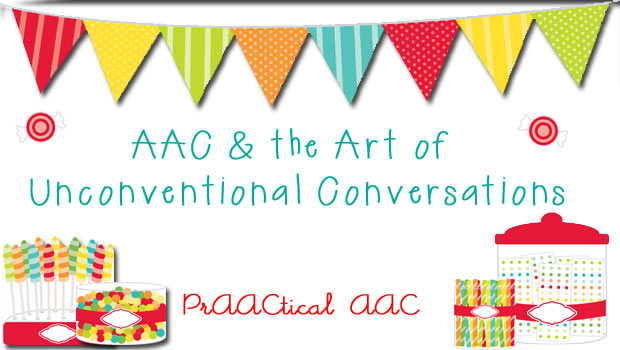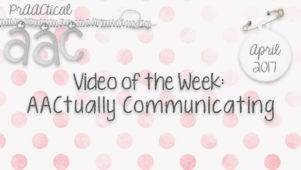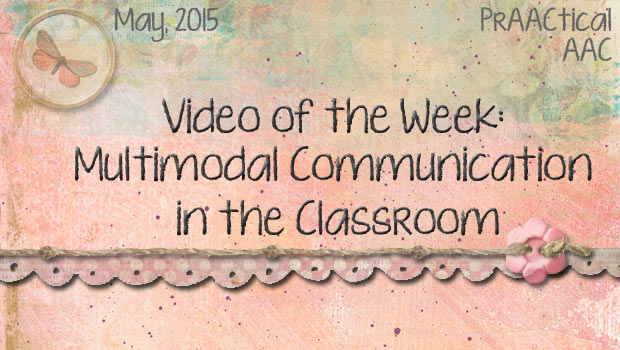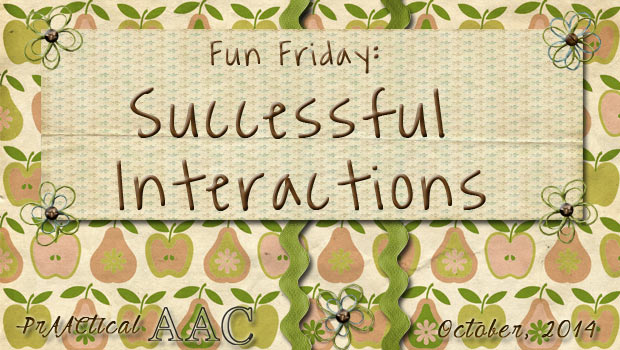AAC & the Art of Unconventional Conversations

There’s an art to having a conversation with someone who has significant communication challenges. One of my favorite experiences with this dates back to the 1980’s, when I was working with a preschooler who had Rett Syndrome. Julia was a beautiful little girl who lived with her (very young) mom and her grandma. Grandma watched Julia while mom was in school, and I spent a good amount of time visiting them in their modest home (a trailer) trying to earn their trust and figure out how to help Julia communicate better in school.
–
At home, as it turns out, she was communicating just fine, at least for the very basic things. A typical conversation between Julia and her grandma went like this. Julia paces around the coffee table, wringing her hands, rocking a bit, and staring at the carpet. She pauses in front of the TV and Grandma says “Not right now, sugar.” Julia rocks a little harder and Grandma says ‘No means no.’ Julia stops rocking. “That’s my girl. Come sit with Grammy.” Julia crawls into Grandma’s lap and all seems right with the world.
–
There are two things I love about that memory. One is how totally tuned in ‘Grammy’ was to Julia’s communication. She ‘read’ her grand daughter’s communicative acts better than many of us would have. The other thing I just love about this is how ‘normal’ the conversation felt, even though Julia was signalling without the use of pictures, signs, or spoken words. It was a just a regular exchange. Just a Grandma trying not to spoil her little girl.
–
Julia, who didn’t demonstrate object permanence or means-end relationships when tested, was having a conversation. A real one. There are a lot of people who would look at her developmental profile and the deficits she had and conclude that Julia was ‘not ready’ for AAC. We’ve all heard those same arguments. We’ll talk more about assumptions regarding prerequisites for AAC in a later post, but for now, let’s skip over that and fast forward to Julia after her school team had gotten some guidance on AAC intervention.
–
Six months later, Julia was:
- looking at more than 20 familiar objects and people, when named, with 80% accuracy
- beginning to use a ‘no’ signal when she didn’t want something (rather than getting upset)
- consistently making choices between preferred and non-preferred objects and activities
- making requests with communication boards that had 3-4 object symbols
- using a calendar box with support to know what activity was next in her day
- independently using a talking switch to engage in classroom routines, like singing the ‘Hello’ song
- operating switch toys purposefully and playing interactively with adults and peers for 8-10 minutes
–
Not ready for an AAC system? Sorry, folks. The data said otherwise.
Filed under: PrAACtical Thinking, Strategy of the Month
Tagged With: communicative acts, Conversations, Multimodal
This post was written by Carole Zangari






3 Comments
I have seen this with so many of my kids with similar developmental profiles, kids with diagnoses that seem to place this giant scarlet letter of preconception on their chests! I don’t know how we break these thought patterns in our colleagues and other professionals, although I know data is a good start! But how do you get others to see what you see when you can’t always give it a number? The parents see it, we see it, how do we bridge that to meet others where they are? Great post and one that makes my heart smile to know that I get to fight for my little guys to help others see how awesome they are!:)
Love that you talked about another girl with Rett. Our daughter was diagnosed with Rett just over a year and a half ago. So few people know about it. Thanks for the insights!
Lindsay, girls with Rett are teaching us how much we don’t know about determining what an individual really understands or how much they can learn. We need to make gigantic bulletin boards: Presume Competence! AND also give ourselves as therapists the time to learn new strategies and technologies to better serve these kids. I truly believe a lot of SLPs just don’t know what to do to help them. They aren’t bad or lazy – they just don’t know what to do to move communication forward. Thanks for stopping by and for your comment.